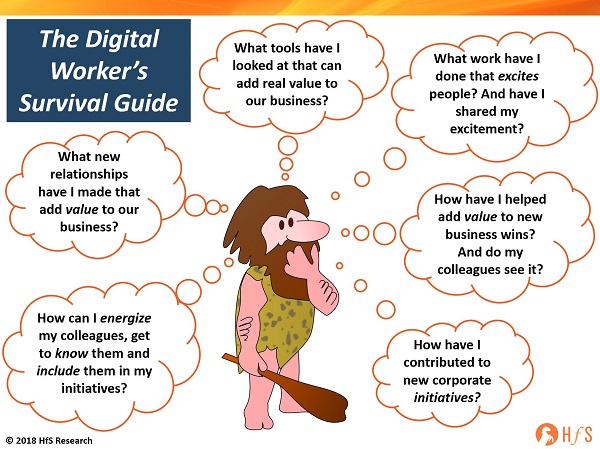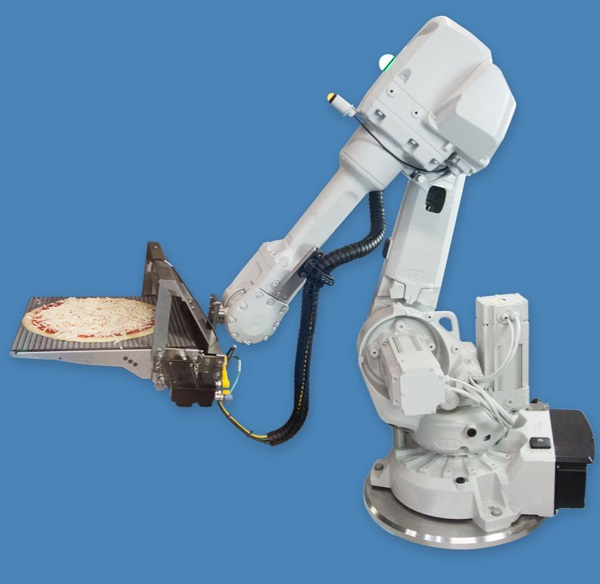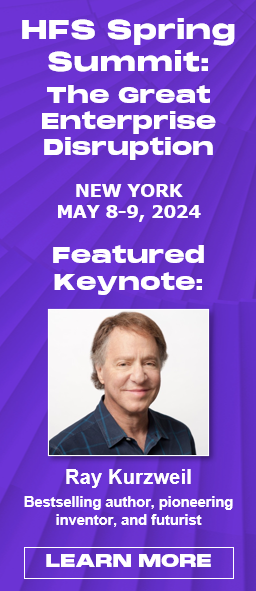
Yes, people, as we inch towards the dreaded singularity, we will continue to be bored silly with arrogant diatribes describing how “humans can stay relevant”.
Do we really need to hear this daily splurge of pontifications from business leaders in Davos about reskilling the workforce, without any real practical advice on what that reskilling is? I would argue this is more about culture and attitude, than training students to learn new programming languages and data analyst skills. The latter will come naturally as the needs of the workplace change, my view is that it’s the former which poses the real challenge: how can we enlighten people to change their working attitudes to make them much more valuable and irreplaceable to their employers? Anyone can fix a line of code within hours, or slam in some new software, it’s what you actually do with the tech that really counts.
It’s what you do when your boss isn’t looking, that makes you less predictable and more valuable
It’s not just about performing predictable tasks, it’s also about helping your firm devise new ways of doing things – that is the magic that makes staff valued. The truth is the singularity is a gimmick to jazz up advances with intelligent computing capability; the reality is the present and the future of the workplace are converging before our very eyes, and the survival of the digital worker depends on our ability to be looking constantly at where our firms are going, and being part of that journey.
The future of every type of ambitious commercial business, whether it’s a factory making products, a bank loaning money, an IT support shop helping users, a grocery store selling goods, a law firm prepping available information for its client cases, an analyst firm producing insight… is to perform its business operations with the optimum balance of talent, so it can maximise its immediate profits, with an eye on the future to stay ahead of the competition. As soon as someone’s output is predictable, taking inputs from various sources to produce outputs, you can start to figure out how to program software and machines to perform said tasks – and computers will always be cheaper than humans, once they are functional and can do the job. So our goal has to be about furthering our abilities, not only to get the basics of our jobs done, but to immerse ourselves into helping our colleagues and bosses figure out the what next. Because if we only focus on the now, we are eventually going to render ourselves predictable and replaceable.
Xerox and Zume: Two ends of the comfort/innovation spectrum
However, not all businesses are ambitious – some just want to milk what they have, squeeze as much as they can out of their current product and then exit. Just look at Xerox – the firm developed a tremendous product for many years (and was the most patented and innovative workplace technology alongside the emergence of the IBM computer back in Don Draper time), which literally dominated a market in such a way that their brand became a verb. However, Xerox just couldn’t find a way to become something else as copying documents became a commodity practise, and recently took its final payday before becoming part of Fujifilm.

Maybe some firms and some boards just aren’t destined to do anything else, and those who made millions and retired off their stock can sip their martinis and congratulate themselves on their success (and luck). However, for every millionaire, there will be a thousand mid-career folks rendered practically unemployable with a legacy skillset servicing a legacy product. So often we see people clinging onto the past with their careers, when it’s abundantly clear their train has left the station. Good money today doesn’t always mean a healthy long-term decision, and there are so many people facing that predicament. What of the bank teller facing branch closures and their role being BPO-ed? Or the insurance inspector being replaced by flying drones with webcams? Or the call center agent being phased out for an intelligent chatbot? Or the investment analyst being replaced by smart algorithms? We can just go on and on and on… and there are so many more examples, such as the case of Zume pizza.
Zume, a typical Californian disruptive business, makes its pizzas with robots, and can deliver up to 200 at a time thanks to remotely controlled ovens inside their delivery trucks, their patented “Cooking en Route” system. It’s secret sauce is literally automation (not tomato purée) which speeds pizzas to market more cheaply, efficiently and at scale (and delivered freshly cooked ant hot). Instead, it can invest its profits in hiring creative people to think of clever occasions with which to personalize and sell pizzas (i.e. during The Superbowl and Game of Thrones). In short, tasks that are automatable such as rolling out the dough, adding on the sauce and toppings and placing the pizzas into and out of ovens are much more cost effective to use machine labor. And when predictable intelligence is needed, such as forecasting weather conditions and popular events can benefit from a machine learning algorithm, the supply chain mechanism can be astutely optimized to get products to hungry customers quickly and profitably as possible. Hence, the human skills are being pushed further and further up the creative value chain, such as designing a Philly cheese steak pizza for Eagles fans, or a lobster roll pizza for new England fans (OK I just made those up, but you get the picture).

If you are an employer looking for creative talent, would you rather hire a successful Xerox executive who’s kept that beast trundling along for the last couple of decades, or someone who’s been immersed in the exciting growth of Zume over the past 18 months? Hmmm…
The secret sauce to an ambitious business lies in energizing its culture and mindset to focus on the now and the next
As we have discussed, predictable is not the secret sauce – the secret sauce is what you do when no one is looking, the less obvious tasks that make you irreplaceable. The key is to immerse yourself into the personable side of the business to become part of how the company drives value. This means making your value less simple to put on a spreadsheet – successful companies are those that create a culture that is unique to them, where its people are engaging in an enthusiastic way to find new sources of value for their firm, while enjoying being part of that journey. People who love what they do and energize those around them are rarely fired.
In the case of Zume, once you have your intelligent pizza supply chain perfected, the human differentiator lies in marketing the product to drive the customer experience, which means having teams of smart people who love the product and work enthusiastically to come up with ideas to win in their marketplace. It’s the same analogy with many insurance firms, where the whole process of managing an insurance process and developing smart algorithms to predict risk are increasingly digitizing (with the help of outsourced support), and the human edge lies with insurance firms out-marketing and out-thinking each other to offer the customer something that is more appealing to them? Do we really care whether Geiko or Progressive insures our cars? Probably not, but we will buy with whoever targeted us most effectively and made it easiest to get the transaction done. Or it may be as simple as which TV commercial appealed to us to the most – the frog with the British cockney access or the friendly Flo who just seems to trustworthy and nice. The simple reality here is as routine tasks become automated and the data becomes increasingly predictable with the use of advanced analytics and machine learning, the human skill lies in establishing the culture of a firm and the creativity in connecting and engaging as impactfully as possible with a customer base which just wants to be served as quickly and touchlessly as possible. Do we really care about talking to a pizza order-taker or an insurance customer rep on the phone, when we can just order something on an iphone app? I bet we’d hardly care if a drone rang our doorbell with a piping hot pizza at out front door, as long as it tasted great and was delivered quickly. And you wouldn’t have to tip either =)
The Bottom-line: Future workplace success is as much about attitude as it is skillset, where we need to focus on this convergance of the present and the future
If I have to hear yet another “we need to fix the skills gap” diatribe from some plastic HR analyst I am going to become a Belgian trappist monk and brew very strong beer all day. But I think you already knew that… so hear are some takeaways:
Get out of your silo. Get to know your colleagues and get them excited about what you do. Even if your work areas don’t converge that much, how hard is it to give up some time to get to know who you’re working with, and exploring how you can help each other. While we are all becoming digitally lazy with our social interactions (and many other activities) we need to focus harder on our people relationships to energize those around us. So get back to having lunch with colleagues… call them up to air ideas. Don’t be unafraid to get people to explain what the hell it is they actually do (because they are likely clueless whay you do also…).
Get to know some useful tech. Whatever you do, where are cool apps to enhance your job, whether its collaborative apps and social software, graphics and content packages, data visualization and analytics tools, CRM tools, RPA/RDA/BPM and easy-to-use process configuration software… you don’t need a computer science degree anymore to use this stuff. If you mastered that beast called PowerPoint, you can certainly use some of the sexier tools in the market and… and evaluating them is almost always free. If you’re not using some form of new tech in your job, then something is going amiss… or you’re just too busy selling your next photocoper to care.
Get to know your firm’s business better. Your bosses should be driving themselves nuts trying to get one over the competition and come up with new ideas for disrupting your market. Insert yourself in that conversation… everyone has a few good ideas in them somewhere. By showing you care about the business adds to your value and inclusion… and you’ll learn more about the business model and help people think through some clever options. If you just don’t care about the business your work in and really can’t be bothered to support your firm with its future, your current career track may be getting very limited…
Include others in what you do, even if it’s boring. Everyone loves being included in what others are doing… inclusion far out-trumps boredom. If someone enthusiastically shows you how he RPA-ed some workflows together, you’d just be happy he showed you how he did it, even though he may be dis-invited to your next pool party.
Being smart about data is no longer geeky, its career-critical. If you can’t automate and digitize your rudimentary processes, you will quickly run out of value to any organization. Plus, every siloed dataset restricts the analytics insight that makes you a strategic contributor to your business. You really can’t create value or transform a business operation without converged, real-time data. You don’t need to have a mathematics masters to understand your customers and the markets in which your operate – you just need to explain to your colleagues what you need and make sure it gets done.
Tune up your cross-cultural intelligence. We need to do a lot more than merely understand cultural differences – we need to adapt and modify our behaviors as the situation dictates as our workplaces and business environment continues to globalize. That means we need to get smarter about different senses of humor (and different sensitivities), widely differings levels of political correctness, different styles of engagement (most Americans tend to like to talk a lot more than most Europeans, for example and their meetings often last longer). Also be sensitive to time zones – the days of expecting people to take 4.00am calls are pretty much over. And be prepared to talk more about geopolitics – many people just want to talk about the big issues more openly these days (even Americans where political discourse has been taboo in days gone by). My only advice here is to try to listen, even if you are in violent disagreement with someone…
Posted in : Design Thinking, Digital Transformation, sourcing-change







Loved the xerox and Zume examples ! What a stunning read Phil !
Nice piece Phil Fersht ! At the risk of a pun, food for thought
Mathieu
Phil – Thanks for sharing the awesome write up! Needless to say, the message in the image is bang on
Terrific piece Phil. A great example of one firm looking backwards and another forwards – I need to try a slice of that Zume!
Alan
Good takeaways. Data is no longer geeky!
Great write-up – You have nailed it Phil .. Thanks
Very well articualated piece, Phil. I think you have nailed this with the attitude trumping skills. As technology advances, it gets easier to use data analytics tools and visualize intelligent workflows, not harder. Technology is becoming the enabler to focus on higher value, more creative tasks, where attitude is so much more important that just having a huge IQ and ability to write complex code!
Technology liberates brainpower!
Great article. Phil you`ve got the point.
Superbly articulated and high introspective. This is the first article which is perfectly driving the message home. Loved the analogy of Xerox and Zume.